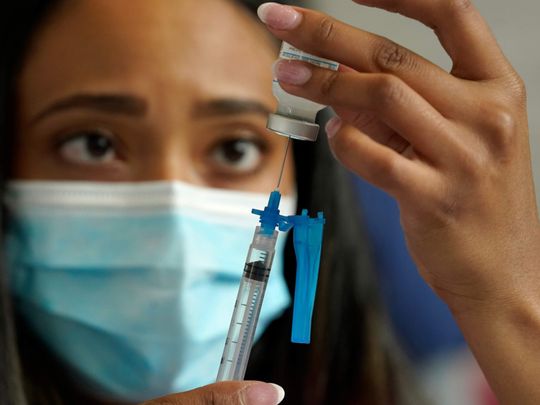
Washington: Federal regulators on Friday authorised Pfizer-BioNTech and Moderna COVID-19 vaccine boosters for all adults, a one-size-fits-all strategy designed to shore up Americans’ defenses against a tenacious virus and reduce confusion over guidelines that have varied based on people’s age, occupation and where they live.
The Food and Drug Administration cleared the boosters for people 18 and older who are at least six months past their second shot of the two-dose vaccines. The move reflects an urgent effort to spur the uptake of boosters to counter waning vaccine protection heading into the winter holiday season when millions of people travel to see friends and family. It’s also an attempt to put in place a coherent federal approach as about a dozen states move ahead on their own to grant broad access to boosters.
Even as the Biden administration scrambles to put universal boosters in place, it has been leapfrogged by New York City and several states, including Louisiana, Maine and Colorado, where worried officials already have endorsed widespread use of the extra shots to try to stave off a spike in cases over the holidays.
“The states made the right decisions, but the optics are awful in appearing to go rogue and undermining the federal agencies,” said Peter Hotez, a professor of pediatrics and molecular virology and microbiology at Baylor College of Medicine.
Booster shots of messenger RNA vaccines have been available for people 65 and over, as well as others who could be at higher risk of severe disease, since mid-September. Under federal guidelines, recipients can receive any of the three authorized shots as a booster, regardless of the brand of their initial vaccine.
More than a third of fully vaccinated seniors had received a booster as of Thursday, according to the Centers for Disease Control and Prevention, and 17% of fully vaccinated adults overall have had an additional shot.
Worry that the effectiveness of initial inoculations could fade as the weather cools and more people socialize indoors has driven the most recent push for wider use of boosters. Data presented to US drug regulators by Pfizer, Moderna and Johnson & Johnson suggested all three of the currently authorized vaccines in the US have seen their efficacy diminish.
Numerous states, including Arkansas, California, Colorado, Kansas, Kentucky, Massachusetts and New Mexico, as well as New York City, have already opted to make boosters broadly available. In many of those areas, cases are climbing after a slowdown in the summer’s delta-variant-fueled surge.
At the same time, some scientists say that the evidence the vaccines are losing their protective power is thin and the need for boosters among healthier groups isn’t clear-cut. Some also worry that broader use of boosters could undermine confidence in the initial series. Additionally, allowing younger people to receive third doses of messenger RNA vaccines could increase the risk of myocarditis, a cardiac side effect seen mostly in adolescent males, some fear.
The Biden administration has leaned hard into making boosters broadly available. In August, the White House promised ready availability of supplemental doses before regulators had authorized them, causing some pushback from FDA staff and experts.
The CDC emphasized in October, after first authorizing booster shots for Moderna and J&J vaccine recipients, that it remains focused on getting shots into the arms of people who remain unvaccinated. About 69% of the total U.S. population has received at least one dose of a vaccine through November 18, according to the agency.








